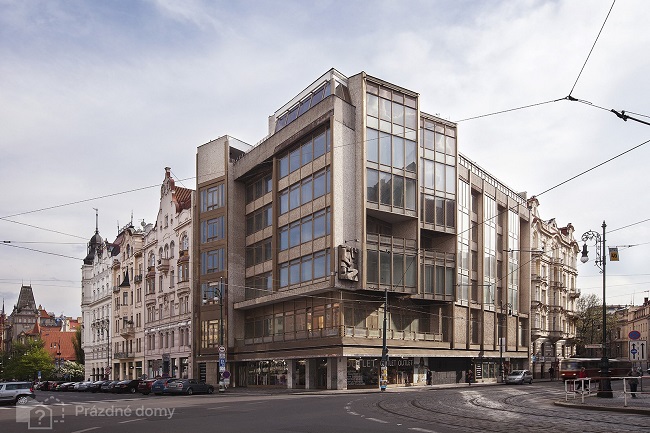
Experts propose to declare the student union building a monument
 |
Prague - Architecture historians from the Czech Technical University (ČVUT) submitted a proposal to declare several buildings from the second half of the 20th century as cultural monuments. Among them are the former International Union of Students building on Paris Street and several houses constructed during the completion of the National Theatre, including the New Stage. They consider all these buildings to be excellent representatives of brutalist architecture in Czech territory. With this mass proposal, they also aim to highlight the inefficiency of the declaration process for buildings as immovable cultural monuments.
CTK was informed about the submission of the proposal by Klára Brůhová from the Institute of Theory and History of Architecture at the Faculty of Architecture of ČVUT, who submitted the proposal along with her colleague Petr Vorlík. "Regarding potential new monuments in Prague, the Ministry of Culture of the Czech Republic has not initiated almost any new proceedings for several years, even though numerous proposals have been submitted. The only exception is buildings that are at immediate risk of demolition." Brůhová stated. CTK is seeking a statement from the ministry. Previously, it stated that proceedings for recent buildings are complicated and that even the professional public is not united in its opinions on their potential protection.
Proposals for the declaration of immovable and movable monuments can come from officials, but also from anyone who decides to do so. In the case of post-war monuments, proceedings are initiated in the vast majority on the initiative of individuals or associations. Not only experts from ČVUT criticize the ministry of culture for not making systematic decisions and for paying little attention to post-war architecture, which may be susceptible to pressures from developers and fears of potential lawsuits due to disruption of investments.
The proposal includes, in addition to the mentioned buildings, also the building of the Urological Clinic VFN and 1. LF UK on Ke Karlovu Street in Prague 2. According to Brůhová, there are three buildings in the area of the National Theatre, including the New Stage and a building called Themos, which the state recently repurchased. A few years ago, the National Heritage Institute proposed declaring the New Stage a cultural monument, which has its own commission for the protection of monuments from the second half of the 20th century. The building by Karel Prager from the early 1980s is protected within the Prague Monument Reserve, but this protection only applies to the exterior. The management of the National Theatre intends to renovate the building, and the authors of today's proposal are primarily concerned about interventions into the interior.
The website Post-War Architecture, which is managed by the Institute of Theory and History of Architecture, states that among the buildings for which the Ministry of Culture rejected monument protection and which were subsequently demolished or "destructively rebuilt" by the owner is, for example, the Praha Hotel in Dejvice, the telephone exchange in Dejvice, the Omnipol building in Nekázanka, or the heating plant in the Invalidova housing estate. Other buildings, including the Transgas complex or the U Hradeb house on Mostecká Street, were also rejected; in the case of Transgas, demolition is planned. In the whole of the Czech Republic, there are about two dozen objects from the same period that the ministry has refused to declare as monuments, according to the website. In some cases, the Ministry of Culture has revoked previously granted monument protection, as was the case with the former Palace of Culture, now the Congress Center, in Prague.
The ministry does not publish the results of proceedings regarding declarations as cultural monuments; participants in the proceedings learn of them. According to Brůhová, among the buildings that have recently been declared monuments are, for example, the train station in Cheb or the swimming pool in České Budějovice.
According to Brůhová, the ministry takes a negligent approach to buildings from the second half of the 20th century, thus endangering them. As a missed opportunity, she cites the Parkhotel in Prague. "We submitted the proposal for declaration as a cultural monument in April 2017; the proceedings have not yet been initiated, while the hotel's interior has undergone a destructive reconstruction," the architecture historians from ČVUT stated. Similarly, proceedings have not yet been initiated or have not reached a conclusion regarding the buildings of Strojimport, the Intercontinental Hotel, Centrotex, the Prague Planetarium, the crematorium in Motol, the student dormitory in Podolí, or the Větrník student dormitory.
The English translation is powered by AI tool. Switch to Czech to view the original text source.
0 comments
add comment







